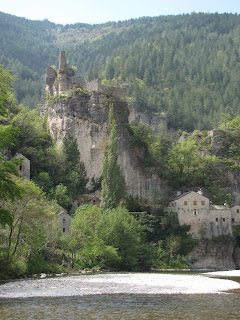Our visitors arrived Thursday evening after a few days in Paris Rīga Clermont-Ferrand
After a breakfast of croissants and pain de chocolat Friday morning, we were on our way to the Gorges du Tarn. The Tarn river begins in the uplands of Mont Lozère at an altitude of 1,575m/5,167ft and eventually reaches the Causses region where it flows through the gorges it has created; impressive ones, over a distance of more than 50km/30mi. Before entering the gorges we stopped to eat lunch east of the little town of Ispagnac Tarn . Cheese and charcuterie on a baguette washed down with a glass each of beer (wine later!).
Continuing west we crossed the Tarn to Castelbouc, named after the enormous billy-goat that was supposedly seen in the sky over the castle when the lord, who chose not to join the Crusades, died. The ruins of the castle are on a steep rock over 60m/200ft high, standing guard over the village whose houses back right up against the cliff.
Soon we entered Ste-Énimie, where we stopped at a sidewalk café to enjoy the sun and the view of the river. The town was a hotbed of activity, with kayakers, bicyclists, RVers and other tourists strolling through the town and preparing their equipment for the next stretch of their trip. After finishing our coffees we crossed the bridge and headed south away from the river, winding our way up the southern cliffs through tight switchbacks until we reached the Causse Méjean plateau.
Our destination was Grotte de l’Aven Armand, an enormous underground cavern. An assistant of famous speleologist E-A Martel found the crevice known by local farmers as l’aven, or “the swallow hole” in 1897, and after initial exploration it was named after Louis Armand, the assistant. A 220yd tunnel has been excavated for access and leads to the foot of the 244ft-deep chimney the explorers first came through. The gallery measures 195x325 feet and is 146 feet high. The guided tour gives historical and scientific information while visitors walk among the giant stalagmites, some 80ft in height with bases 10ft in diameter of amazing shapes and colors. It was like entering the world of Dr. Seuss and the Truffula trees! I was glad we made the detour; it added on an hour of driving-time and a bit of stress to get there before closing time (), but was a good deviation from the scenic viewpoints and gorge-following. During our tour, at one point we passed another chimney that seemed to descend endlessly into the darkness, and according to our guide there is still exploration currently underway of some of the caves departing from the main gallery. Once above ground again, we took a quick look at the unassuming chimney leading downward to the gallery (the original l’aven) before retracing our route back to Ste-Énimie.
Our next stop was Cirque de St-Chély, with its gorgeous little village on the south bank of the Tarn accessible only by a bridge from the scenic D 907. With its little Romanesque church, a waterfall that seemingly flows directly from underneath a chapel, and easy access to the river, Roberts and I agree that we will return and stay at one of the gites. There was definitely a big difference between Ste-Énimie and St-Chély-du-Tarn in terms of tourist volume, and it was reluctantly that we returned to the car to continue our trip west.
We passed Pougnadoire village, whose houses were embedded in the rock, then Château de la Caze, a 15th century château that looked straight-out of a fairy tale. Then, just as the sun started its descent beyond the gorge, we arrived at our 16th century castle hotel. After a delicious three course meal we enjoyed a glass or three of wine in the beautiful courtyard before turning in for the night.






Cik burvīgi! Nevaru sagaidīt ar jums kopā eksplorēt šīs vienreizēji skaistās, vēsturiskās vietas -- (vai pili spokojās...?
ReplyDelete